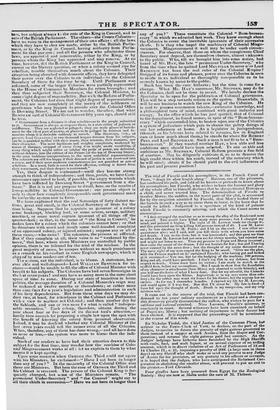The trial of Fieschi and his accomplices, in the French
Court of Peers, " drags its slow length along." Boireau, one of the prisoners, has confessed his guilt, and told all he knows or pretends to know about his accomplices; but Fieschi, who wishes to have the honour and glory of the whole affair to himself, declares that he always treated Boireau as a child, and never trusted him. The determination of Fieschi to involve Morey, the saddler, in the worst parts of the plot, is accounted for by the suspicion admitted by Fieschi, that Morey loaded three of the barrels in such a way as to cause them to burst. in the hope that he would be killed. Subjoined is a specimen of the kind of palaver which Fiescbi is constantly uttering, and which the Court seems to encourage- " I first arranged the machine so as to sweep the alley of the Boulevard next to myself. This would have killed many more persons; but 1 changed my mind, and pointed it higher. The sight of 31. Lavocat made me change it; and this prevented me from killing 150 persons instead of 40. 1 saw M. Lavo- cat; he was speaking to 31. Pavis ; and I let go the cord. I saw other ac- quaintances also ; and I said, will you kill those with whom you have eaten and drunk. I ran to the door, but it was barricaded ; and this gave me time to reflect that 31. Lavocat had not seen me for eleven months, bad rejected me, and might not listen to me. Then my promise to Pepin and Morey occurred ; then came the sound of the drums. I did not hesitate for fear; fear and I having never entered by the same door ; but the thought of my crime devoured me. The mere sight of one man cayscd the King to be saved. ' Give me the plan, with the Princes marked on it,' exclaimed Fieschi ; who having got and looked at it continued—' You see, but for the budging of the machine, 100 persons, King and all, would have perished. I don't say this in my defence, but from respect to truth. Crime must have its victim ; I am ready to march to the scaffold first, before my accomplices. But I speak to show that the foundation of my character is attachment [here Morey was observed to smile bitterly], and you will see the fruits of what I have done. But for my attentat, the Cossacks would have been upon the Rhine. Ingratitude is in any eyes worse than rob- bery; for the robber may want six francs for his dinner, but the ingrate has no excuse. As for me, I remember benefits. I exposed my life for M. Lavc.cat, and would again if I was free. But that I'll never be My fate is fixed.—I have fed upon the thought of death. Death is my companion, and my only mistress now."' It came out in the course of the trial, that Fieschi had been con- demned to ten years' solitary confinement as a forger and a sharper : this discovery greatly disconcerted the ruffian, wbo wishes to pass for a sublime and national criminal. Ninu Lassave, Fieschi's mistress, is coostuntly in court. Several witnesses have been examined on behalf of Pepin and Morey ; but nothing of importance in their favour has been elicited. It is supposed that the proceedings will be terminated in the course of this week.
Sir Nicholas Tindal, the Chief Justice of the Common Pleas, has written to the Town-Clerk of York, to decline, on the part of the Judges, to receive in future the gratuity of eight guineas presented to them instead of a supper at each Assizes, from the Mayor and Cor- poration; and returns the eight guineas paid last summer. As the Judges' lodgings have hitherto been furnished by the High Sheriffs with coals, fuel, and malt liquor, at an annual expense of no trifling amount, which is in direct violation of an Act of Parliament of 13 and 14 Charles II., c. 21, imposing a penalty of 200/. (a large sum in those days) on any Sheriff who shall make or send any present to any Judge of Assize for his provision, or any gratuity to his officers or servants, it is hoped that the Judges, who have anticipated the Reformed Cor- poration in abolishing the smaller abuse, will proceed to put an end to the greater.— York Chronicle.
Four giraffes have been procured from Egypt for the Zoological Society: they are now at Malta under the care of M. Thibaut.


























 Previous page
Previous page